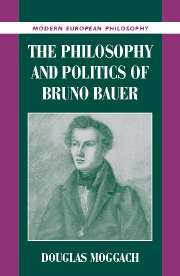Book contents
- Frontmatter
- Contents
- Preface
- THE PHILOSOPHY AND POLITICS OF BRUNO BAUER
- Introduction: “The Friend of Freedom”
- I FOUNDATIONS: AESTHETICS, ETHICS, AND REPUBLICANISM
- II JUDGING THE OLD ORDER
- 3 “The Other of Itself”: The Critique of the Religious Consciousness
- 4 “Revolution and the Republic”: The State and Self-Consciousness
- III THE EMANCIPATORY PROJECT
- IV JUDGING THE REVOLUTIONARY MOVEMENT
- Epilogue: After the Revolution: The Conclusion of the Christian-Germanic Age
- Appendix: Bruno Bauer, “On the Principles of the Beautiful” (1829)
- Notes
- Bibliography
- Index
4 - “Revolution and the Republic”: The State and Self-Consciousness
Published online by Cambridge University Press: 05 June 2012
- Frontmatter
- Contents
- Preface
- THE PHILOSOPHY AND POLITICS OF BRUNO BAUER
- Introduction: “The Friend of Freedom”
- I FOUNDATIONS: AESTHETICS, ETHICS, AND REPUBLICANISM
- II JUDGING THE OLD ORDER
- 3 “The Other of Itself”: The Critique of the Religious Consciousness
- 4 “Revolution and the Republic”: The State and Self-Consciousness
- III THE EMANCIPATORY PROJECT
- IV JUDGING THE REVOLUTIONARY MOVEMENT
- Epilogue: After the Revolution: The Conclusion of the Christian-Germanic Age
- Appendix: Bruno Bauer, “On the Principles of the Beautiful” (1829)
- Notes
- Bibliography
- Index
Summary
Simultaneously with his biblical critiques, Bauer's political interventions occur in the context of the growing conservatism of the Prussian state. In the era of Frederick the Great, Prussia had posed as the model of reforming enlightened absolutism. These reforming tendencies continued in the wake of the French Revolution through the efforts of Stein and Hardenberg. King Friedrich Wilhelm III, however, retracted or circumscribed the reforms that had been enacted under the duress of the Napoleonic occupation and refused to fulfil his promise of a constitution. Officially, Prussia considered itself a Rechtsstaat or constitutional state, to the extent that its activities were to be governed by a fundamental law, the Allgemeines Landrecht of 1794, but that document failed to delimit the power of the crown, or to provide a doctrine of the derivation of power from the consent of the governed. Being compatible with both aristocratic privilege and serfdom, it did not establish juridical equality among subjects. It could not satisfy liberal or republican aspirations. An initial wave of protest and opposition, which assumed the ambiguous form of the Burschenschaften movement, was repressed with the enactment of the Karlsbad decrees of August–September, 1819. After 1830, agitation was revived. The struggle centred on the representative character of the Prussian provincial assemblies and, increasingly, on the demand for a constitution and a single, unified parliament for Prussia.
- Type
- Chapter
- Information
- The Philosophy and Politics of Bruno Bauer , pp. 80 - 96Publisher: Cambridge University PressPrint publication year: 2003



